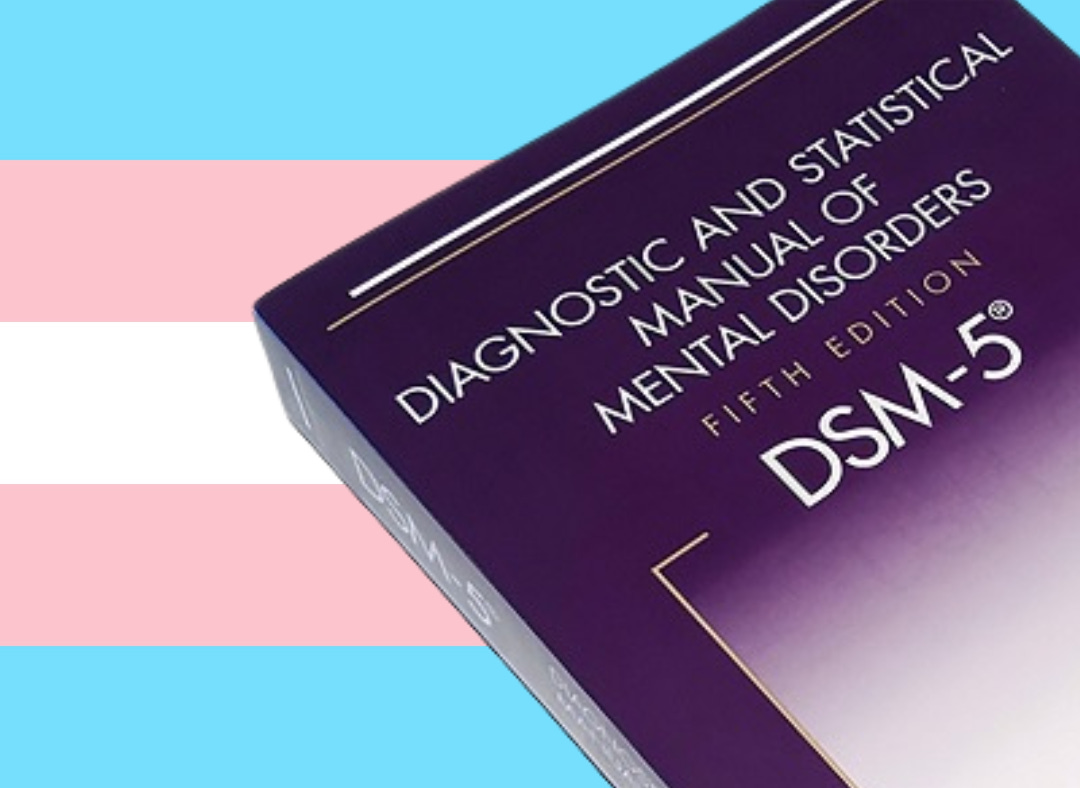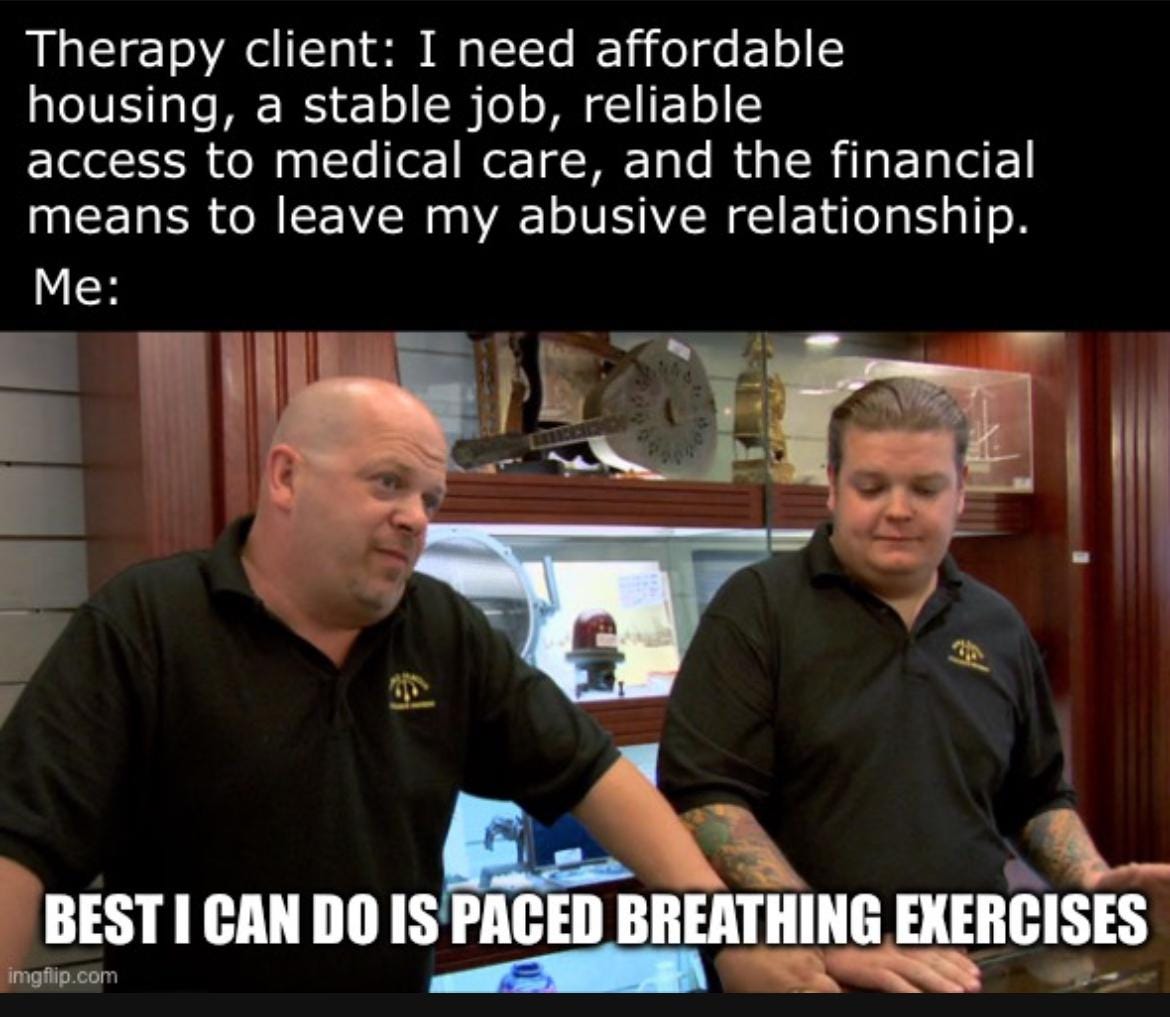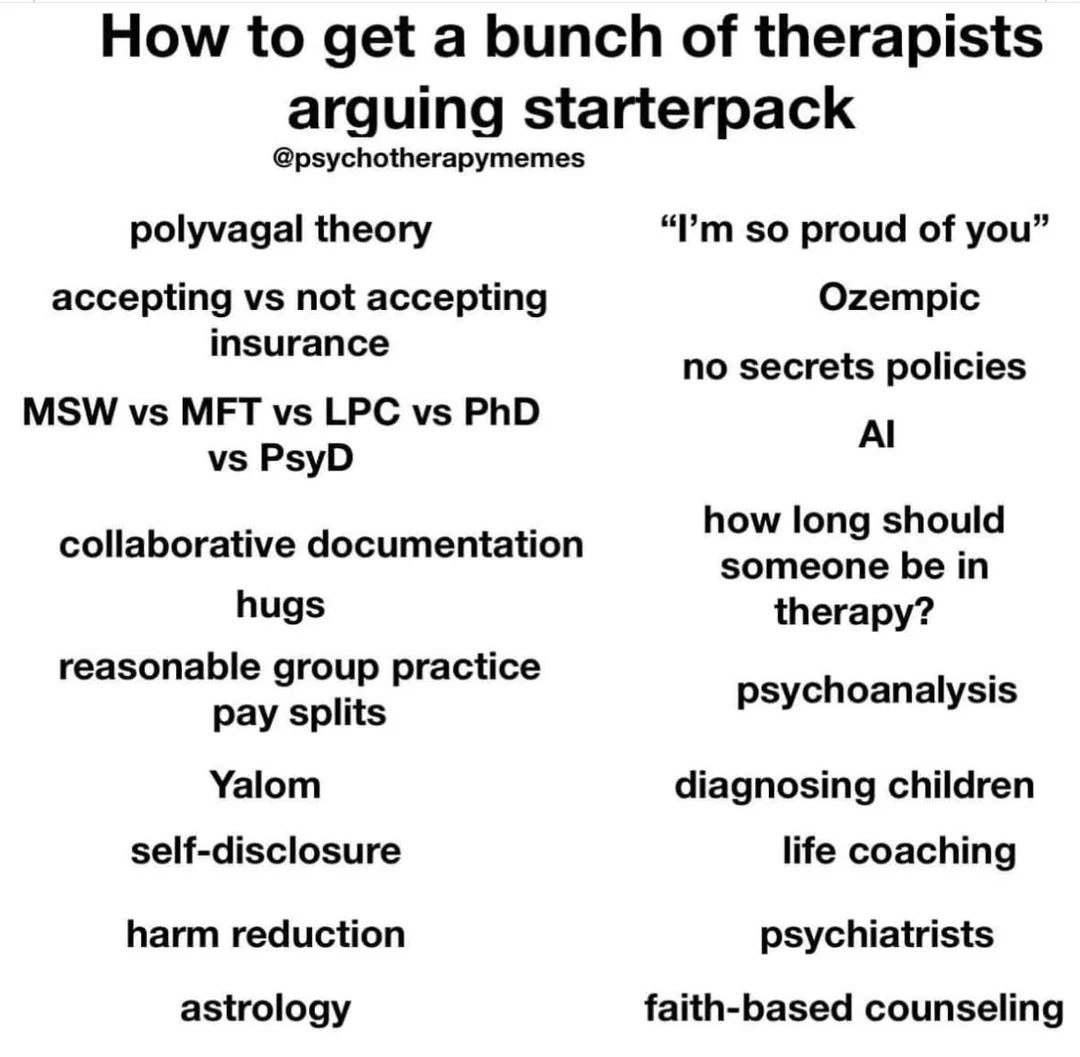Where Are All the Trans Therapists?
Why we don’t (and won’t) see them in the numbers we need, even though we all could really use them right now
On Thursday, August 21st 2025, God cut the ribbon for a brand new all-gender restroom: the grave of Dr. James Dobson. If there’s any justice in the moral balance of the universe, Dr. Dobson (noted homophobe, racist, and founder of the deeply demented Focus on the Family media empire) is doing the breast stroke in a boiling lake in hell right now, where he will spend eternity choking on every square inch of pain he inflicted on the world we’re all glad he’s permanently vacated.
I have a lot to say about James Dobson, but I’m hoping you have the patience for a detour first. We can leave him where he is for now; there’s no exit ladder up from the underworld. He’s not going anywhere.
Because it’s people like James Dobson who have all but guaranteed that queer and trans people like me will always need therapy. It’s no secret that the LGBTQ+ community has higher rates of depression and anxiety, so it shouldn’t come as a surprise that we also seek therapy at something close to twice the rate of our cisgender and heterosexual peers. That number will likely keep climbing as we watch this new generation work tirelessly to destigmatize therapy and mental health, and despite the conservative push to roll back protections for queer people, Gen Z is shaping up to be the gayest and transest generation to date.
So it feels alarming that with the rising tide of demand, there seems to be an inexplicable lack of transgender therapists.
This came into focus for me on the eve of the 2024 presidential election as I was scrolling Instagram and trying very hard to convince my nervous system that I was not being actively hunted for sport. A flyer floated into view on my feed advertising a workshop:
”Managing Stress as a Trans Person in 2024”
I couldn’t click “add to cart” fast enough, but then something possessed me to double check the account where the ad originated. It was as I feared — the group would be led not by a trans person like me, but by a surely well-meaning cisgender woman with an “LCSW” at the end of her name.
And what’s the problem with that? Can’t she empathize? Can’t she do a good job leading trans people through stress management? Can’t we just help each other without worrying if we have everything in common?
Of course we can, but it is also odd that we so often see identity-focused spaces meant to help us driven by people who will never know the deepest roots and nauseating minute realities of our existence. It’s the same reason you’ll never see me advertising healing spaces for black women or disabled Jewish veterans. It is, frankly, not my lane. Empathy has limits. You can know some of it, but not all of it. And it matters.
This is the same reason why there are (or used to be) so many initiatives set up to diversity classrooms so the teaching population more directly reflects the realities of the students we serve— we trust, relate, and learn better when we see ourselves in the people who are there to help us. Additionally, trans people have historically struggled as “walking encyclopedias” for our cisgender therapists, acting as guides for them as they navigate unfamiliar language and community-specific concepts. Many of us have had infuriatingly similar circumstances where we wonder: “Why am I paying someone who keeps asking me questions that could be answered in Trans 101?”
Which brings us back to this— why was this workshop being hosted by someone who couldn’t possibly understand the whole of our lives? Why aren’t there more competent, seasoned diverse trans therapists ready to fill the void and bridge the gap where they are most needed?
Because to bill insurance, as the advertisement for this group made clear was an option, the facilitator had to be the owner of four very important letters at the end of her name: “LCSW.”
There are other letters too —if you aren’t an LCSW (licensed clinical social worker), you could be a LPC (licensed professional counselor), LMFT (licensed marriage and family therapist), or the coveted PhD — but they all have the same big bold problem: there are vanishingly few trans people who have them.
Unfortunately, the data we want here doesn’t really exist. There isn’t currently a group tallying the number of practicing trans therapists in the US, and with the Trump administration’s open disdain for data and the LGBTQ+ community, we are unlikely to see that shift anytime soon. But the 2022 U.S. Trans Survey (the largest of its kind, surveying more than 92,000 trans people across the country), found that only about 7% of us have an education past a bachelor’s degree, and the Association of American Medical Colleges (AAMC) reports that “less than 1% of U.S. medical students and physicians self-identify as transgender.” It stands to reason that the “official” number of licensed transgender therapists in this country is likely very small.
II
The road to becoming a therapist in the U.S. is both winding and steep, and the barriers seem to be constructed almost comically high. Because there are a couple of avenues to becoming a practicing therapist, I’ll be focusing on the one I know the best: the LCSW. Advanced degree programs for social workers usually require one (if not two) unpaid internships, plus two licensing exams (running about $300 each). After graduation, you’ll need a total of 3,000 hours of supervised practice under an LCSW, which will take, at minimum, two more years. Supervision can cost between $60-100 a week if you don’t take a criminally underpaid and unsupported position where you can get it for free. And then, when you do finally cross that finish line, you have to renew that license every two years, which will run you another $200-300.
Licenses are issued on a state-by-state basis, meaning that in order to practice (even virtually) in more than one state, a professional will have to double up with many of these requirements, paying multiple licensing boards for the privilege of accepting clients outside their own state lines.
In the research I did for this piece, I stumbled into a Reddit thread filled with LCSW candidates who were comparing the money they’ve invested in their own pursuits to become licensed therapists. The average? Anywhere from $4,000-$10,000, and that’s after the cost of graduate school.
As a former teacher, all of this reminds me so much of the barriers we see in education, where we are asked to submit to a year of “student teaching” as we work through our credentialing program, which is essentially a period of time where we pay for the privilege of working in a classroom for free (usually without the option or ability to work an additional job to support ourselves). It’s like a test to see who can hold their breath and make it out in time, but not all of us get to take in enough air to begin with, and the reward is a profession that is both undervalued and underpaid.
But why would any of this affect transgender LCSW candidates specifically?
It’s time to return again to that Trans Survey:
Of the more than 92,000 respondents, more than a third reported that they were currently experiencing poverty, and our overall unemployment rate is 18% (the national average? 4.2%). More than 11% of us have been fired, laid off, or forced to resign due to our gender identity. And while many people turn to family support as they work their way through higher education, between 12-29% of trans people characterize their relationship to their immediate families as “unsupportive.”
As much as we want to believe that we’re all racing from the same starting block, we aren’t. And even without systemic barriers, people finishing this process are going through an American Gladiator obstacle course of bureaucracy and financial hardship.
III
It’s important to point out that none of this is part of some ancient traditional practice that can’t possibly be changed. The licensing process for therapists (as we know it today) started to take off in the 1970s, and it found its footing specifically so mental health professionals could bill medical insurance and establish a “universal code of ethics.” Ultimately, the working therapists of the time wanted a system that would grant them the same prestige and respect as their peers in the more body-focused medical field.
But the system they landed on is not, by any means, a foolproof one.
Licensing can be helpful, but can also trick people into thinking anyone with letters after their name are infallible and beyond truly necessary criticism.
I told you that we would come back to Dr. James Dobson, and look, he’s exactly where we left him.
If you were wondering where the “Dr” came from at the start of his name, you should know that before he became a public skid mark, he earned a PhD in psychology from the University of Southern California before he became an Associate Clinical Professor of Pediatrics in Los Angeles, where he counseled children and drew the asinine conclusion that all of their troubles stemmed from a “rejection of authority,” and that a return to more physical violence at home would cure them right up. For seventeen years, he worked in the division of Child Development and Medical Genetics at a counseling center, where he published works about the dangers of feminism and the family benefits of corporal punishment.
The little “PhD” at the end of his name helped him as he established the conservative hate machine “Focus on the Family,” opened a gay conversion practice in the 90s, and published 36 books before his death.
We want, so desperately, to feel as if there is a shortcut to knowing if someone is worthy of our trust and respect, and academia can lead us to believe that the answers come from how long someone has committed their lives to research and learning. Sometimes, it’s true— but not always.
Dr. Oz, a board-certified cardiothoracic surgeon, spent years on television telling us that the arsenic in apple juice was a danger to our children.
Dr. Ben Carson, a neurosurgeon and oncology professor (and later U.S. Secretary of Housing and Urban Development), thought that the Egyptian pyramids were used for grain storage. And after attending President Trump’s election night party during the height of the pandemic in 2020, he attempted to cure himself with homeopathic oleander.
There really aren’t any shortcuts to assuming competence.
IV
In the code of ethics for practicing therapists, professionals promise to uphold the “dignity and worth of the person” and “service, social justice, and integrity,” which is a worthy, if not a little vague, pledge. And despite it, the Trevor Project has found that there are more than 600 licensed practitioners offering anti-LGBTQ “conversion therapy” in the US across 48 states right now, with 70 more in active training for licensure. Therapists have their own internal moral compass, and there’s never going to be a guarantee that they all point due north.
There are procedures for reporting therapists who may be acting outside of ethical practices, but many people might not know where to begin, or what qualifies as unprofessional conduct. For many of us, speaking out against an authority figure of any kind is exceptionally challenging. Outside of the obvious, the uninitiated might not even know that they’re on the receiving end of unethical behavior.
This was the situation my transgender husband found himself in as he finished his own master’s degree in social work.
Throughout his program, Xilo (pronounced Shy-low) completed two unpaid internships (I double-checked with him to make sure they were unpaid, and he laughed at me). While the first was an overall positive experience, the second was not. Similar to the “Better Help” style of 21st century digital therapy, the company that offered him his non-optional internship was a for-profit app. Instead of hiring a team of experienced therapists to lead online chats with paying clients, they brought in (exclusively) a league of unpaid interns. The (approximately) 30 interns were responsible for 100% of the text-based client chats, and were offered essentially zero support from their one supervisor.
During his time working for this company, Xilo witnessed as his peers were verbally and sexually abused by clients, and gaslit and abandoned by the licensed therapists who were tasked with supervising them. Data was skewed for the app’s investors, and 100% of the ill-gotten profits were pocketed by the people who allowed it to happen.
I watched as a trans man who wanted nothing more than to become a therapist began to seriously doubt the long term efficacy of his chosen profession. This couldn’t be it, could it?
Like me, Xilo had also left a helping profession that used and abused its most dedicated professionals: education. It’s no secret that teacher burnout is a major drain on the profession, with more than half of educators reporting that they plan on leaving the classroom earlier than expected.
We’re seeing similar data with therapists, who are only seeing demands for their services rise as supports stagnate. Just about half say they can’t keep up with the needs of their many clients, and just as many say that they are nearing the point of irreversible burnout.
In 2021, the National Association of Social Workers (NASW) updated their code of ethics to include an emphasis on provider self care, but there haven’t been a ton of provisions in the profession itself to allow for it. There are still a lot of therapists who are looking for help, with not much help to be had.
V
Arguably, the most profound case for licensing as a practice (outside of public accountability) is the commitment to professional development. Anyone can stagnate in their worldview, and there’s a huge benefit to requiring that the professionals in charge of your mental well being keep learning.
It’s a great idea that doesn’t always shake out in practice. Like in education (and many more professions, I presume), older models and ideas about mental health and wellbeing are still an active part of the PD circuit, and in some cases it actually may serve to keep less helpful modalities around longer.
I can’t help but think again of my husband, who jumped at the chance to audit a training specific to his special interest in the therapy space: autism. But he would be disappointed again: the training wasn’t led by autistic practitioners, but by LCSW’s who acted as if there was no way an autistic person could possibly be in the room with them. The talks were shockingly outdated, lacked trauma-informed practices, and left him feeling like he was being peered at through a clinical fishbowl. He left early and asked for a refund.
Xilo’s own complaints about the system he was about to enter stacked: he didn’t like that billing insurance meant that he would have to diagnose all of his clients (insurance claims require a diagnosis code from either the ICD10 or the DSM5, both texts with a long history of anti-LGBTQ diagnoses). As much as he understood the benefits of community accountability, he saw the failures of LCSW licensing and his own financial limitations. As a biracial trans man, he knew this was what he wanted to do— but how?
Xilo was feeling what so many would-be transgender therapists had felt before him. There aren’t more of us because we’re less likely to have the luxury of stability, and because of the long, expensive processes built first to keep us from the gate and then to keep us in poverty once we’re through. Which sucks, because we’re the ones who would benefit the most from a therapist who really understands us.
As Audre Lorde said: “Without community there is no liberation.”
VI
To be clear, this is not an anti-therapy article.
In this house, we budget for therapy the way that some households budget for groceries.
We live in just 200 tightly packed square feet, and own exactly one bookshelf. On it, more than half of our books are specific to therapeutic work. We have titles like Judith L. Herman, MD’s Trauma and Recovery, Pete Walker’s The Tao of Fully Feeling, and Richard Schwartz, PhD’s No Bad Parts.
We are both in therapy, with therapists who both have “LCSW” after their names. We counted through our closest immediate friends and found that more than half of them are licensed therapists. We love therapy. And we also know that there are some limitations in the systems that were set up in the time of Disco Fever that we can’t ignore.
Because we can’t test or license for the parts of a therapist that make them truly effective:
Are they doing their own inner work?
Are they committed to the kind of growth that requires them to move past their egos and embrace their limitations?
Just because someone is a therapist, just because someone’s website says they’re LGBTQ+ friendly– doesn’t mean they’re doing the work for that to be true.
And it’s the kind of work that never ends. We’ve been doing it for as long as we’ve had human consciousness, and there is no graduating from it. We are, all of us, going to have to tend our own fires forever.
And that’s what gets right down to it: the role of a therapist, of a coach, of a facilitator and sounding board – this isn’t something new or even something uniquely Western.
If everyone should be in therapy, who was doing social work before 1970? Who’s doing this now, in the past, and everywhere else? Historically, it’s been our elders, people with lived experience, and other kinds of spiritual teachers.
Trans people don’t need saviors, we need each other. We need community, and we need options. Sometimes that’s going to be with licensed therapists, but not always. Institutions are always going to be the last to change. They are not innovators, and will never be out in front of the rising tide of a shifting landscape. Institutions also do not benefit from flexibility, even when people do.
So while we might not be able to fix everything all at once and break down the barriers keeping so many trans people from a profession we desperately need, we can be open minded and adaptable as we figure out what we need next. And really, it’s the least we can do.
This is the part where I jingle my hat and tell you that the best way for you to support my work is to become a paid subscriber on Substack. Did you know that the vast majority of your subscription goes directly to us? And though I am opposed in principle to paywalled content, paid subscribers get exclusive access to our chat!
If you’ve ever felt moved or connected or challenged by anything we’ve made, consider becoming a subscriber.
Also — we didn’t get into this in the article, but after finishing his MSW, Xilo made the decision to work as a coach rather than become a licensed therapist. If you’re curious about his work, check out his website here.









I enjoyed the article. Thank you for the insights into Xilo’s journey from considering licensure to going the coach route. Im a trans masculine person who is a licensed therapist and I also coach on the side.
I think there’s going to be a big shift towards the coaching model. As an LCSW, I try to support queer, trans and nonbinary people headed towards licensure by offering low cost supervision and low or no cost consultation hours. I also managed to get licensed through the generosity of awesome people who offered the same to me.
I enjoyed the article, but one minor note. Ben Carson did not die of COVID in 2020; he was still the secretary of HUD in 2021. While he did attempt to treat COVID with oleander, it didn't work and he later received regeneron treatment. He is still alive today.
I think you may be thinking of Herman Cain, who did die of COVID in 2020 after a rally in Arizona.